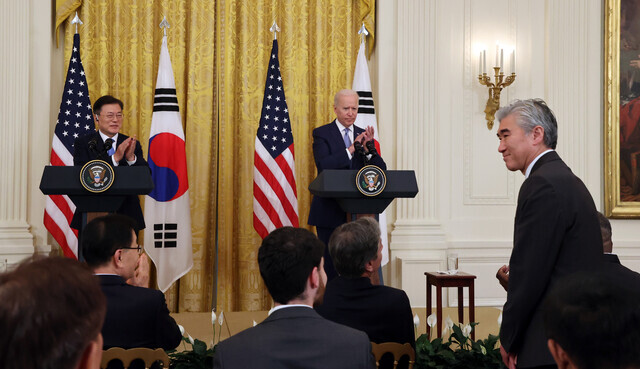hankyoreh
Links to other country sites 다른 나라 사이트 링크
[Editorial] The ball is in everyone’s court for peace on Korean Peninsula

After South Korean President Moon Jae-in and US President Joe Biden emphasized the need for dialogue and diplomacy with North Korea based on the inter-Korean Panmunjom statement and the US-North Korea Singapore statement, US Secretary of State Antony Blinken repeated the call for North Korea to reciprocate.
“We put that forward,” Blinken said during an interview with ABC on Sunday, referring to the US’s North Korea policy.
“We’re waiting to see if Pyongyang actually wants to engage. The ball’s in their court.”
Biden personally unveiled a pragmatic and calibrated approach to North Korea aimed at the complete denuclearization of the Korean Peninsula in his summit Friday with South Korean President Moon Jae-in. Biden also used that occasion to announce the appointment of Sung Kim as the US special envoy to North Korea, emphasizing his commitment to dialogue with the North.
The Biden administration had originally intended to eliminate the position of special envoy to North Korea, who has led dialogue and negotiations with the North. But Washington dramatically changed its position following persistent appeals from Seoul.
Deliberations with South Korea convinced the US to keep the priority on North Korea policy and to signal that it’s willing to initiate negotiations whenever Pyongyang sends the word.
Significantly, the South Korea-US summit has created momentum for making new progress on North Korea-US talks, which have been stalled since the rupture in the US-North Korea summit in Hanoi in February 2019.
Another achievement is Biden’s public expression of support for inter-Korean cooperation, creating independent space for inter-Korean relations.
If the newfound momentum leads to the reactivation of North Korean nuclear talks and the Korean Peninsula peace process, there needs to be a genuine effort from all parties concerned: South Korea, the US and North Korea.
North Korea might be disappointed that Moon and Biden didn’t mention easing sanctions on North Korea or curtailing the South Korea-US joint military exercises, as Pyongyang has requested. North Korea regards the sanctions and joint exercises as being part of the US “policy of hostility” toward the North.
However, the proper approach is for North Korea to return to dialogue and work out those issues through negotiations.
“There’s clearly a possibility of a flexible approach in which ‘phased and synchronous’ rewards could be offered, depending on how clearly North Korea expresses its commitment to denuclearization during the process of direct dialogue between North Korea and the US,” said South Korean Unification Minister Lee In-young on Monday while discussing sanctions on North Korea.
South Korea and the US need to offer a roadmap made of concrete and realistic steps that can advance US-North Korea dialogue through inter-Korean cooperation. They should also quickly decide how to adjust joint military exercises scheduled for August to induce North Korea to join dialogue.
When it comes to moving toward peace on the Korean Peninsula, the ball is in everyone’s court.
Please direct comments or questions to [english@hani.co.kr]

Editorial・opinion
![[Guest essay] Preventing Korean Peninsula from becoming front line of new cold war [Guest essay] Preventing Korean Peninsula from becoming front line of new cold war](https://flexible.img.hani.co.kr/flexible/normal/500/300/imgdb/original/2024/0507/7217150679227807.jpg) [Guest essay] Preventing Korean Peninsula from becoming front line of new cold war
[Guest essay] Preventing Korean Peninsula from becoming front line of new cold war![[Column] The state is back — but is it in business? [Column] The state is back — but is it in business?](https://flexible.img.hani.co.kr/flexible/normal/500/300/imgdb/original/2024/0506/8217149564092725.jpg) [Column] The state is back — but is it in business?
[Column] The state is back — but is it in business?- [Column] Life on our Trisolaris
- [Editorial] Penalties for airing allegations against Korea’s first lady endanger free press
- [Editorial] Yoon must halt procurement of SM-3 interceptor missiles
- [Guest essay] Maybe Korea’s rapid population decline is an opportunity, not a crisis
- [Column] Can Yoon steer diplomacy with Russia, China back on track?
- [Column] Season 2 of special prosecutor probe may be coming to Korea soon
- [Column] Park Geun-hye déjà vu in Yoon Suk-yeol
- [Editorial] New weight of N. Korea’s nuclear threats makes dialogue all the more urgent
Most viewed articles
- 1Yoon’s broken-compass diplomacy is steering Korea into serving US, Japanese interests
- 2[Guest essay] Preventing Korean Peninsula from becoming front line of new cold war
- 3[Column] Why Korea’s hard right is fated to lose
- 4S. Korean first lady likely to face questioning by prosecutors over Dior handbag scandal
- 5[Guest essay] Maybe Korea’s rapid population decline is an opportunity, not a crisis
- 660% of young Koreans see no need to have kids after marriage
- 7After 2 years in office, Yoon’s promises of fairness, common sense ring hollow
- 8[Column] The state is back — but is it in business?
- 9[Editorial] Penalties for airing allegations against Korea’s first lady endanger free press
- 10[Column] Can Yoon steer diplomacy with Russia, China back on track?